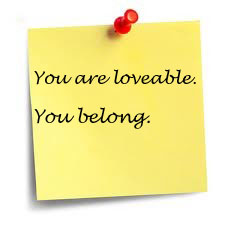There are many paths towards emotional health and maturity. My favorite modalities include Shadow Work®, Meditation, the Enneagram Personality System and emerging practices like Neurosculpting®. I’m sure you have your own techniques and leaders to recommend. We have many choices in our journey, but what is vitally important is that we each find ways to grow into our emotional maturity. For me emotional maturity means: taking responsibility for my experience and being a creative force in my world.
 What is the key to achieving emotional maturity? No matter what modality you use, your job as an adult is to find out what healthy messages you need to hear about yourself, and make sure that you receive and believe those messages. If you do not, you may act out of past wounds, and be a harmful force instead of a blessing in your world.
What is the key to achieving emotional maturity? No matter what modality you use, your job as an adult is to find out what healthy messages you need to hear about yourself, and make sure that you receive and believe those messages. If you do not, you may act out of past wounds, and be a harmful force instead of a blessing in your world.
We all get a lot of messages about ourselves throughout our childhood and young adulthood. Whether through words or actions (or lack of words or actions), early influencers in our lives make a big impression on our developing egos. Along with the healthy messages, we also get shaming ones, even from the most well-intentioned caregivers. The major shaming messages that we get fall into four categories (using the Shadow Work model): You are Bad, You are Not Enough, You Don’t Exist and You Don’t Love Right. There are probably one or two of these that resonate most strongly with you from your childhood. And it may still be playing itself out over and over again in your adult life. Not only is this hard for you, it can hurt the people around you.
An Example
For instance, a toddler’s mom was worried he was becoming too clingy so she told him “you are too clingy, stop touching me!” As a man, his partner might complain that he doesn’t hold her enough, but he doesn’t know how to because at a young age he was taught that touching made him needy (which was bad). In both circumstances, he is getting the message “you don’t love right”. I believe that the path towards emotional maturity requires that this man find a way to genuinely say to himself, and to believe, that he does love right. And not only that he loves right, but that he is love. Whose job is it to make sure that he hears that? It is his job. Only then can he experience true intimacy. And that committed experience to owning our own stuff, not blaming others, is what being an emotionally healthy adult is about.
I recommend getting help from skilled emotional growth leaders (Shadow Work®, Neurosculpting®, EnneaMotion®, coaches and therapists) to identify and shift patterns. If you want to work on some of your patterns on your own, experiment with these steps:
A Healthy Practice
First, identify a wound that shows up as chronic fears or discomfort, negative results, relationship blunders, difficult feedback, or professional hold-ups.
People are always leaving me out. I never get invited anywhere.
Name the critical message your are receiving about yourself in this circumstance.
“You don’t belong, you’re not loveable”.
Remember the first time you heard that message, in word or action.
I was 7 and my father remarried and had a new baby. I felt left out and abandoned. I was sure there must be something wrong with me because I suddenly got no attention from him.
Figure out the anecdote to this message, using real language that speaks to you, not just platitudes. What would you at that age needed to have heard to be supported and loved?
“You are loveable, and you belong,” and maybe “The world needs you.” 
Gently remind yourself of that message in yoga sessions, in meditation, with sticky notes in your car or mirror.
Recognize times when you are tempted to act out of your belief that you are not loveable, and forgive yourself. Choose to act differently in the moment.
Surround yourself with people who support your healthy message about you and don’t believe the untruths you’ve told yourself for so long.
Engage in a modality that helps you safely go to the shadowy places in your subconscious where the shaming messages were planted.
Transformation isn’t just about inspiring quotes or mantras (thought those are helpful). Mantras alone do not retrain the neural pathways that have supported our beliefs for a long time. I’ve encountered people who just seem to flip their negative messages into forceful, inflated talk. For example, “I am loveable, I belong” can easily turn into “Everybody love me, I’m so Special! I belong everywhere and have no boundaries!” Mantras are useful as internal blessings that help us see ourselves and others in that light. Don’t use them as new, fun ways of living your wounds. A person who adopts the attitude of forceful specialness/lovableness is sure to alienate people and they will end up feeling left out all over again.
Our beliefs about ourselves are powerfully rooted. If you plan on changing them, you will probably need help. However you do it, I invite you to take this on as your #1 job for emotional health: figure out what you need to hear and say it–say it for real, in the core of your feeling-body, in the neural pathways you drive down daily, in the practicalities of your work. And I encourage you to hold your loved ones in that same invitation.
One Response to The Key to Emotional Maturity
Sign up for Helena's Blog
Welcome!
I am a coach, facilitator and program director in Denver, Colorado. I bring a high-performance mindset from 18 years leading in global corporations, startups, non-profits and Higher Ed. I’ve also honed skills in emotional intelligence and practical spirituality through training with ICF, Shadow Work®, Insights Discovery and motherhood. If you’re ready to do powerful inner work, and also get tangible results in your external environment, please follow my blog and reach out to talk about coaching!
Recent Comments
- HelenaAnn on The Four Quarter Model
- Mariette Strub on The Four Quarter Model
- Brianna on Tales of a Working Parent in 2020: The 3 Spheres of Attention
- Ruth Buckingham on Driving in Emotional Weather
- Ruth on Keep Your Labels To Yourself, Thanks









An excellent example of your leadership and work Helena!
Thank you for writing this!